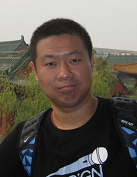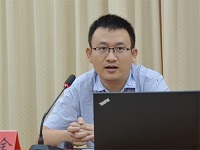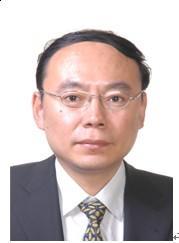
| Prof. Lu Leng School of Software, Nanchang Hangkong University, China
Research Interests:
Biometric Feature (palm print, palm vein, face, etc.) Recognition, Biometric Template Protection, Computer Vision
|
LU LENG received his Ph.D degree from Southwest JiaotoLU LENG received his Ph.D degree from Southwest Jiaotong University, Chengdu, P. R. China, in 2012. He performed his postdoctoral research at Yonsei University, Seoul, South Korea, and Nanjing University of Aeronautics and Astronautics, Nanjing, P. R. China. He was a visiting scholar at West Virginia University, USA, and Yonsei University, South Korea. Currently, he is a full professor, the dean of Institute of Computer Vision, the office director of Jiangxi Province Key Laboratory of Image Processing and Pattern Recognition at Nanchang Hangkong University. Prof. Leng has published more than 100 international journal and conference papers, including more than 70 SCI papers and three highly cited papers. He has been granted several scholarships and funding projects, including six projects supported by National Natural Science Foundation of China (NSFC). He serves as a reviewer of more than 100 international journals and conferences. His research interests include computer vision, biometric template protection, biometric recognition, medical image processing, data hiding, etc. Prof. Leng was awarded Jiangxi Youth May-4th Medal, and is an outstanding representative of "Innovation Talent" of Jiangxi Enterprise in "Science and Technology China", "Jiangxi Hundred-Thousand-Ten-thousand Talent Project", "Jiangxi Voyage Project", etc.
|
|
| 
| Prof. Jingtao Yao IEEE Senior Member, ACM Member, Department of Computer Science, University of Regina, Canada
Research Interests:
granular computing, rough sets, soft computing, data mining, three-way decisions, forecasting, neural networks, computational finance, electronic commerce, Web intelligence, and Web-based support systems
| Dr. Yao joined U of R in January 2002. Before arriving Canada, he taught in the Department of Information Systems at the Massey University, New Zealand, the Department of Information Systems at the National University of Singapore, Singapore, the Computer Science Program of The Open University, Singapore and the Department of Computer Science and Engineering at Xi'an Jiaotong University, China. JingTao received his PhD degree at the National University of Singapore. He did a B.Eng. degree and an M.Sc. degree at Xi'an Jiaotong University.Dr. Yao's research interests include granular computing, rough sets, soft computing, data mining, three-way decisions, forecasting, neural networks, computational finance, electronic commerce, Web intelligence, and Web-based support systems. His research publications in these areas can be found at Publications or Google Scholar Citations. Dr. Yao is the coordinator of the Rough Set Technology Lab, and the coordinator of the The Web Intelligence Consortium (WIC) Canada Research Centre. He is a Member of ACM, a Senior Member of IEEE, IEEE Computational Intelligence Society, IEEE Computer Society, and IEEE Systems, Man, and Cybernetics Society, the president, a fellow and past chair of the Steering Committee of the International Rough Set Society, and also a member of ACCP.
|
|
|
|

| Prof. Zhiquan Liu Professor,
College of Cyber Security, Jinan University, Guangzhou, China
| Zhiquan Liu is a
full professor with the College of Cyber Security, Jinan University. In recent
years, Prof. Liu has published more than 80 SCI/EI papers on authoritative
journals and conferences, such as IEEE JSAC, IEEE TIFS, IEEE TDSC, IEEE TMC,
IEEE TKDE, IEEE TPAMI, IEEE TITS, IEEE IOTJ, IEEE TVT, IEEE TII, IEEE TCC, IEEE
Network, Science China Information Sciences, Information Fusion, Information
Sciences, IEEE ICWS, IEEE WCNC, ACISP, and Chinese Computer Journal (including
more than 40 papers on CCF-A/JCR-1/TOP journals, 4 best papers on international
conferences, and 2 most popular papers on international journals), and has
applied for/been authorized more than 100 invention patents and PCT patents.
Besides, Prof. Liu has served as the Chair, Program Committee Chair,
Publication Chair, Publicity Chair, Finance Chair, Workshop Chair, or Program
Committee Member for more than 20 international conferences. Meanwhile, Prof.
Liu has served as the editor-in-chief of Advances in Transportation and
Logistics, the associate editor of IEEE IOTJ, the academic editor of PLOS ONE,
and the guest editors of two international journals, Security and Communication
Networks and Electronics, and has served as the reviewers of more than 40
authoritative journals and conferences. His homepage is https://www.zqliu.com/. Title: Security, Trust,
and Privacy in Vehicular Networks
Abstract: Vehicular
networks, as an important application of Internet of things in the automotive
industry, and as the core component of intelligent transportation system, can
realize all-round network connection and efficient information interaction
between vehicles and other nearby vehicles, road infrastructures, pedestrians,
and network, etc., so as to provide various information services, improve
driving safety and efficiency, and promote energy saving and emission
reduction. Vehicular networks are regarded as a global innovation hotspot and
an important commanding point of economic development, with huge industrial
development potential and application market space. However, due to the large,
open, highly dynamic, delay sensitive, and other characteristics, the security,
trust, and privacy in vehicular networks face huge challenges. Thus, this talk will
focus on highlighting the recent advances, challenges, and approaches for the
security, trust, and privacy in vehicular networks.

| Prof. Jie Yang Shanghai Jiao Tong University (SJTU), China
Research Interests:
Research direction, image processing, pattern recognition | Jie Yang received a bachelor’s degree in Automatic Control in Shanghai Jiao Tong University (SJTU), where a master’s degree in Pattern Recognition & Intelligent System was achieved three years later. In 1994, he received Ph.D. at Department of Computer Science, University of Hamburg, Germany. Now he is the Professor and Director of Institute of Image Processing and Pattern recognition in Shanghai Jiao Tong University. He is the principal investigator of more than 30 national and ministry scientific research projects in image processing, pattern recognition, data mining, and artificial intelligence. He has published six books,more than five hundreds of articles in national or international academic journals and conferences. Google citation over 19000,H-index 65. Up to now, he has supervised 5 postdoctoral, 46 doctors and 70 masters, awarded six research achievement prizes from ministry of Education, China and Shanghai municipality. He has owned 48 patents. Three Ph.D. dissertation he supervised was evaluated as “National Best Ph.D. Dissertation” in 2009, in 2017, in 2019. He has been chairman and keynote speaker of more than 10 international conferences.
Talk Titel: Recent research work on AI medical Diagnosis Abstract
Part A: Development of a Chromosome Classification Approach Using Deep Convolutional Networks. Bottlenecks of chromosome classification are analyzed. A flowchart of the proposed Varifocal-Net is proposed, including global-scale and local-scale feature learning, and classification based on the fused features. Part B: SEGMENTATION METHODS FOR CHEST CT IMAGE ANALYSIS. A flowchart of the proposed pulmonary nodule segmentation framework is presented. A voxel-connectivity-aware approach for accurate airway segmentation using convolutional neural networks is presented. A flowchart of the proposed method for pulmonary airway and artery-vein segmentation is introduced. More than 10 papers about the above research have been published in top journals (e.g. TMI) and top conferences (e.g. MICCAI). 
|
Prof. Yangjun
Chen
Applied
Computer Science, Winnipeg University, Canada
Research Interests: Very large databases,
Graph databases, Document databases, Multimedia databases, Web databases,
Deductive databases, Federated databases, DNA databases Software engineering, Object-oriented
methodologies, Cooperative systems Algorithms, Graph theory and Combinatorics
| Yangjun Chen is a
full professor at Dept. Applied Computer Science, University Of Winnipeg.
Yangjun Chen received a BS degree in information system engineering from the
Technical Institute of Changsha, China, in 1982, and the Diploma and PhD
degrees in computer science from the University of Kaiserslautern, Germany, in
1990 and 1995, respectively. From 1995 to 1997, he worked as a postdoctor at
the Technical University of Chemnitz-Zwickau, Germany. After that, he worked as
a senior engineer at the German National Research Center of Information
Technology (GMD) for more than two years. After a short stay at Alberta
University, he joined the Department of Applied Computer Science at the
University of Winnipeg, Canada. His research interests include deductive and
federated databases, constraint satisfaction problems, graph theory, and
combinatorics. He has about 100 publications in these areas. |
|
|
|
|
|
|
|
|
|
|